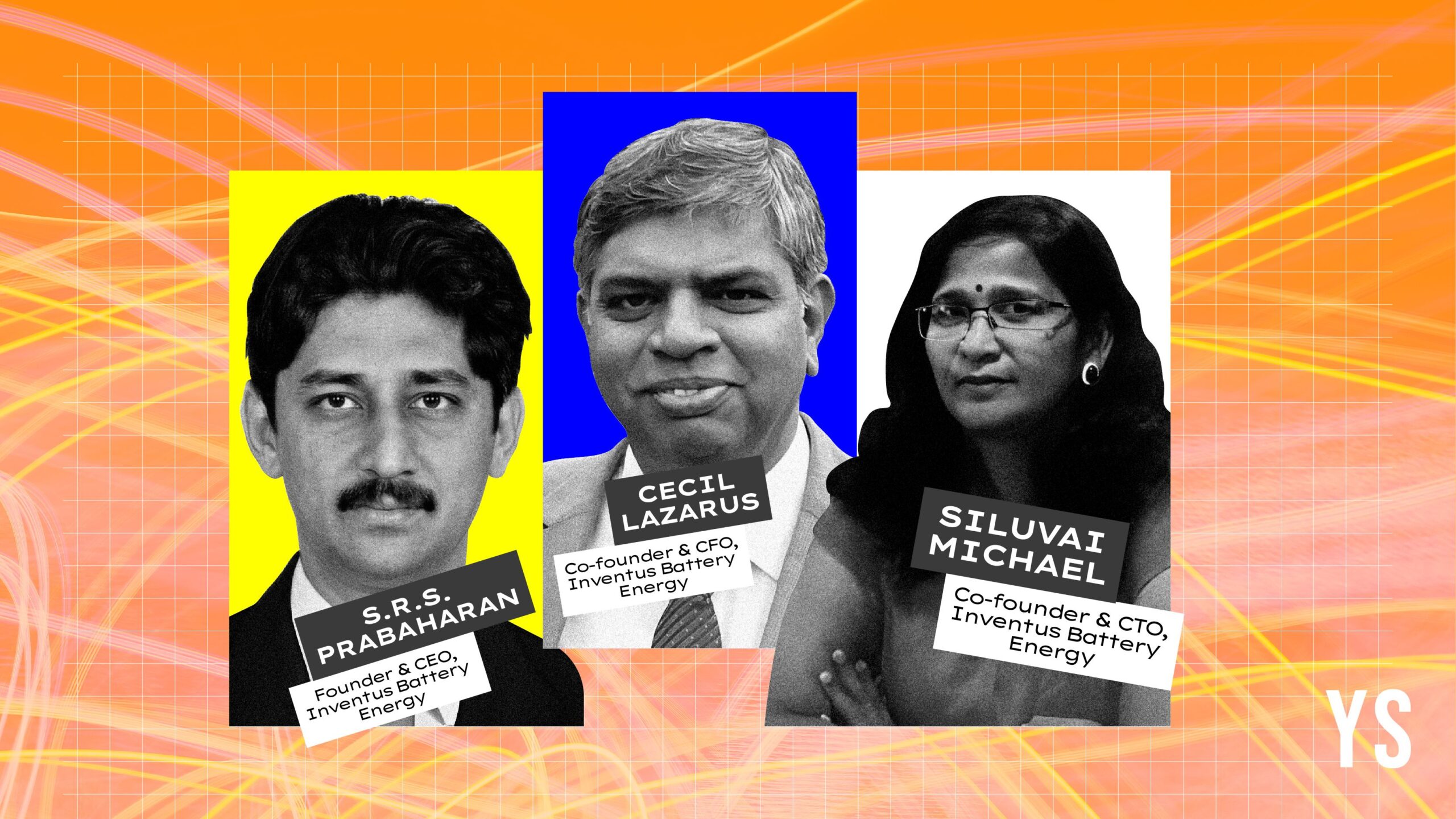Imagine a world where an electric car can drive significantly farther on a single charge and can be charged in minutes instead of hours. With solid-state batteries, this vision can become a reality.
Solid-state batteries are poised to revolutionise how people power everything—from daily devices to electric vehicles (EVs) and renewable energy systems. Unlike traditional lithium-ion (Li-ion) batteries, these next-generation power sources are more efficient, safer, and longer-lasting.
These batteries are set to reshape industries and enhance people’s daily lives with the potential to offer faster charging, higher energy density, and minimal risk of fire hazards. And turning this vision into reality is Chennai-headquartered Inventus Battery Energy Technologies.
“This is our main focus right now because the world needs solid-state batteries, and we want to win the race, at least in India,” Co-founder and CEO S.R.S. Prabaharan tells YourStory.
Why solid-state batteries?
Founded in 2020, the startup’s solid-state battery technology has reached Technology Readiness Level (TRL) 7—a standard scale used to measure the maturity of a particular technology. These levels range from TRL 1 (basic principles observed) to TRL 9 (fully operational and proven in a real-world environment).
Per Prabaharan’s estimates, Inventus aims to reach TRL 8 or 9 levels by 2026, which means “we would be or should be in a position to create A-samples and B-samples for OEMs (Original Equipment Manufacturers).”
Simply put, A-samples are the first fully functional prototypes demonstrating how the product will look and work and are tested to ensure they meet all requirements. The B-samples incorporate changes or improvements based on feedback from the A-sample testing and are further refined to ensure the product is ready for full-scale production.
The startup, when in the A-sample stage or the pre-pilot phase, would manufacture and send limited quantities of solid-state batteries to OEMs for testing and feedback. This would help Inventus refine the product, ensuring it is ready for large-scale production and full commercialisation.
“Our target is 2026 for the solid-state battery to reach the commercial market,” the CEO notes.
In fact, Inventus’ solid-state technology is compatible with existing Li-ion cell manufacturing machinery, with a “plug-and-play” solution, requiring no major modifications to existing machinery.
According to Prabaharan, the startup is developing a flexible solid electrolyte that replaces the traditional separator between cathodes and anodes in Li-ion batteries.
He elaborates that the startup’s work to replace the liquid electrolyte—a vulnerable and dangerous component in current Li-ion batteries that can catch fire and become a “time bomb”—is crucial for improving safety.
For this, Inventus replaces the electrolyte with a ceramic-based solid, similar to fire-resistant materials like clay tiles, preventing fires yet still conducting ions. The ceramic stops the electron flow even if pierced by a nail, making the battery highly safe, says the Inventus chief.
The Chennai startup’s research and development efforts include future battery technologies such as sodium-ion batteries—a strong contender to Li-ion batteries due to the widespread scarcity of lithium. Sodium, on the other hand, is abundant in seawater in the form of sodium chloride and can be easily recovered.
Business overview
Inventus specialises in advanced battery technologies, offering solutions for building and operating Li-ion battery factories. The factory setup support includes everything—from design to equipment recommendations and safety guidance, including fire prevention and risk management during battery production.
It also offers support for key materials for battery production, such as electrodes and electrolytes, and patented cell technologies with expertise in design and manufacturing processes. The company has three patents to its name.
Global players like Fluence, Alsym Energy, Younicos, QuantumScape, and Solid Power and domestic manufacturers, including Amara Raja, Exide Industries, and Tata Power, operate in the advanced battery technologies space.
While all these companies may not directly compete with Inventus’ specific technologies, they are part of the broader battery industry landscape.
Prabaharan believes there is a gap in domestic battery manufacturing, including cell technology, knowledge, and in-house capabilities. Currently, Indian companies focus on battery packing, importing cells from China, assembling them into battery packs, and using them instead of manufacturing the battery cells in-house.
China dominates 85% of the global battery market, not only in battery cells but also in the raw materials production essential for battery manufacturing. The remaining 15% is shared between South Korea and Japan, among other country’s manufacturers.
“We fill the gap in terms of know-how, creation, and licensing for various companies. We also assist companies in setting up their own manufacturing lines here (India),” says Prabaharan
According to the CEO, Inventus is filling the gap in cell technology with its indigenous development of LFP (Lithium Iron Phosphate) and NMC (Nickel Manganese Cobalt) batteries.
Meanwhile, it also specialises in manufacturing raw materials, including NFC and LF3 cathodes and electrolytes. Besides, it offers consulting services for battery recycling and secondary life applications to companies in this business.
Prabaharan says recycling is crucial because spent batteries cannot be disposed of in landfills due to their hazardous nature. In fact, since these contain valuable materials like cobalt and nickel, they can be recovered and reused to create fresh raw materials.
He explains that there are two types of batteries for recycling. First are the spent batteries, which have lost most of their energy and can be recycled directly. Second are the retired batteries, such as those from vehicles, which still have around 70% of energy left.
These batteries can’t be used for propulsion but are suitable for secondary purposes, including UPS systems, home electrification, or solar power storage. Once they reach about 60-70% capacity (usually after a year), they can be dismantled, turned into a powder (black mass), and processed using a hydro-metallurgical method to recover valuable materials, which can then be reused, supporting a circular economy.
To facilitate this, Inventus works with several Indian companies, in Telangana, Gujarat, and other states.
Future plans
In the next 8-12 months, Inventus aims to raise nearly $5 million in a pre-Series A round, the CEO says, adding the startup is deliberating with investors for the round.
It has already secured seed funding of Rs 1 crore through a technology development project from the National Research Development Corporation (NRDC).
At present, the startup has eight employees, including the three co-founders—Sylvia Michael (Head of R&D) and Cecil Lazarus (CFO).
As soon as the fundraising is successful, Prabaharan says, the startup plans to recruit at least ten scientists at the senior level.
“As of now, our policy is not to get into manufacturing because it’s not our strength. It’s a capital-intensive business, and we don’t want to engage in it at this point. However, in the future, we may consider it,” he says.
“For now, our primary focus is to provide support on the technology front, license our own technology, and help companies grow,” he adds.
Inventus Battery Energy Technologies was part of TechSparks 2024, YourStory’s flagship tech startup event held recently in Bengaluru, and made it to YourStory’s Tech30 list, as one of the 30 most promising Indian startups of 2024.










![Read more about the article [Weekly funding roundup Mar 30 – Apr 5] VC inflow dips amid no large deals](https://blog.digitalsevaa.com/wp-content/uploads/2023/10/funding-lead-image-1669386008401-300x150.jpg)